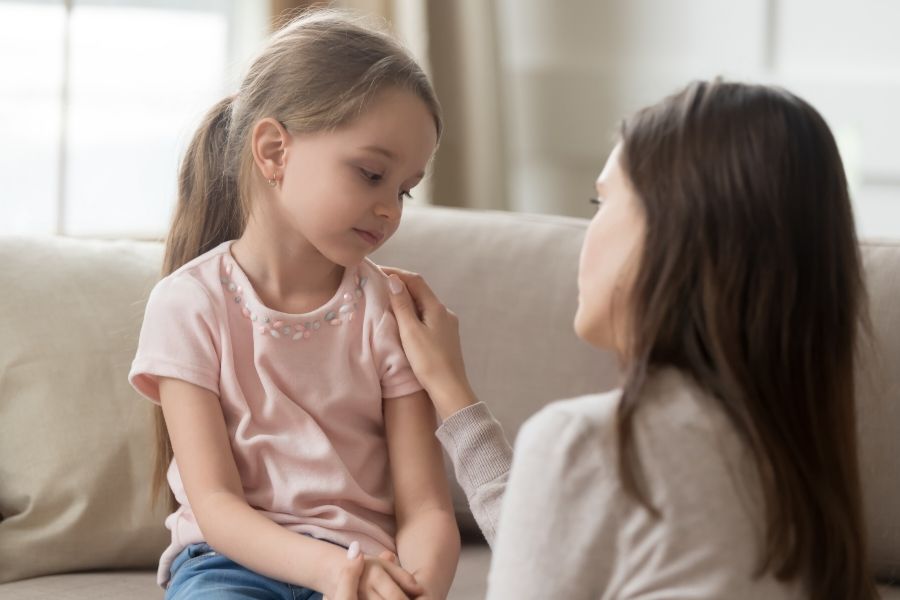Divorcing when you have children can be difficult. It is not just you and your partner who has to come to terms with all of the changes that divorce can bring.  You also need to make sure that you are treating your children properly so that their mental wellbeing does not suffer too much with these changes. Here are some of the ways that you can talk to your children about divorce, no matter how old they are.
You also need to make sure that you are treating your children properly so that their mental wellbeing does not suffer too much with these changes. Here are some of the ways that you can talk to your children about divorce, no matter how old they are.
5 and Under
Children who are aged five and under are likely to be very dependent on their parents. Having one disappear from the family home can be a very strange and upsetting for them. Though they might not be able to articulate their thoughts properly, they might be able to show their feelings through some actions and behaviours. Becoming overly clingy and irritable, or refusing to be comforted by one parent in particular could be a key indicator that they are not handling the divorce as well as they could be.
Make sure that you answer any questions that they have. These might be quite simple, as to whether or not they are going to get to see the parent that is leaving the household. You need to keep explanations as straightforward as possible. With children this age, there is no need to get into detail. Keep stick to the basics.
6 to 11
If your child is slightly older, they might be able to articulate their feelings a little better. You should still try to focus on their wellbeing in this time as they might not always know quite how to express themselves. Try to keep your discussion around the divorce as simple as possible. They might wish to ask questions that require answers that are a little complex. Try to explain as best you can, but still try to keep answers straightforward if possible.
Children who are this age will require a lot of support from you as parents, and it can also be a good idea to let them spend time with friends and others who can offer them support. In particular, you might wish to look into resources like books that explain divorce. These can prove to be very beneficial, especially if you do not know quite how to handle explaining divorce to your children. Just be prepared to be as open as possible, and they will hopefully feel comfortable approaching you when they have a concern.
Teenagers
Dealing with teenagers and divorce can be a little bit trickier. At this age, they are likely to understand what divorce is, and they might have already even supported friends whose parents have divorced. However, there is no knowing how they are going to respond.
It is important to remember that teenagers are under a lot of stress. In addition to striving for good grades in school, they might also need to perform well in sports teams, work in part-time jobs, and maintain good relationships with their peers. A divorce can put a lot more stress on their shoulders. When dealing with teenagers and divorce, make sure that you are willing to communicate with them, but ensure that they are able to process things on their own if they wish. Keep an eye out for destructive or negative behaviours, and make it clear that you are willing to talk to them whenever they want to talk.
Adults
Adult children might not be living in your home any longer, but they will still be impacted by a divorce. This could come as a shock to them as they are used to you and your partner being a unit. The loss of this can be disorientating to even the most grounded of adults.
Though they are adults, it is important that you don’t be too candid with your children about the reasons for the divorce. If they press for details, you can make a decision, but initially you should try to keep things as simple as possible. Be prepared to offer them support, but don’t be surprised if they would like some space to think things through, as we often see with teenagers.
An Impact on the Whole Family
As soon as a child is involved, divorce becomes a lot more complicated. You need to make sure that you sit your children down together to talk through the divorce and listen to any concerns that they might have. Answer as honestly as you can, and be prepared for some backlash. Never assume that you know how your children will respond when you announce a divorce. Though this is going to be a difficult time, you need to make sure that your children know that the divorce is not their fault and that both you and your partner still love them no matter what.
Related Posts:
- First Step in Getting a Divorce: A Beginner’s Guide
- How to Guide Your Child Through a Divorce
- Family Law Review: When Should You Hire A Lawyer For Your Child Custody Case?
- Tips for Fathers to Successfully Get Full Custody of a Child
- 7 Indications That You Require The Assistance Of A Child Custody Lawyer